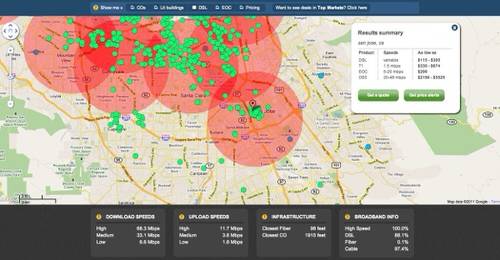When the FCC unveiled its National Broadband Map, it was hailed as a move that would highlight the different levels of broadband penetration in the country. Indeed, when Curt Hopkins covered the story here at ReadWriteWeb, he noted that the government’s broadband map revealed an “unconnected nation.”

The FCC’s map was part of a larger government effort to help boost broadband availability and was hailed as a marker of industry transparency. However, although the map does answer a lot of questions – what providers are operating in an area and what speeds do they promise – it really doesn’t paint a complete picture.
That’s where Bandwidth.com has stepped in, with its own broadband map – available at Broadband.com – that offers a lot more of those missing details, including some crucial ones: how much does broadband cost and what speeds do you actually get.

Like the FCC map, the new Broadband.com tools display data about broadband availability. But this map also includes other information, such as pricing, quality, and true speed. The site leverages data from the FCC and from national ISPs – just as the FCC’s map does. It also includes real-time data and information taken from the top ISP providers’ APIs (not their ads) as well as from the Net Index database – info gathered from the billions of tests run by residential and business users via sites like Speedtest.net.
The tools let users look at broadband data in a variety of ways: comparing speeds by city, looking at average prices by address, and assessing how ISPs are performing in terms of their quality and speeds, for example.
“Today’s businesses need more choice and transparency when selecting a partner for their Internet and communications services,” says David Morten, Bandwidth.com’s CEO. The company hopes, of course, that providing all this information that small businesses will in fact choose Bandwidth as its provider.
Regardless, it’s an interesting tool (and free to anyone), one that makes a more compelling argument than the FCC’s own Broadband Map does in arguing that we need to do a far better job connecting this country with quality high speed Internet.









